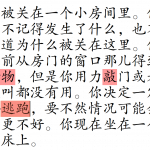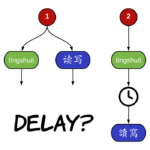Articles in the ‘Reading’ category Page 4
-
Chinese language logging, part 3: Tools and resources for keeping track of your learning
Logging you language learning can be very useful, and there are many tools and resources out there to help you, but which are the best and how do you use them?Logging you language learning can be very useful, and there are many tools and resources out there to help you, but which are the best and how do you use them?
Read → -
The benefits of using Wikipedia to look up words when learning Chinese
Wikipedia is an encyclopedia, not a dictionary, but did you know that it can be better than a dictionary for looking up words when learning Chinese?
Read → -
Lost in transcription: Saylaw, Ice Island and Aristotle
Names of people and places can be quite different in different languages, sometimes so different that it causes headaches for second language learners. Do you know the world’s best footballer, Saylaw? What about Yàlǐshìduōdé? Or are you lost in transcription too?
Read → -
Chinese language logging, part 1: Why and how to track your progress
How much time are you investing into learning Chinese? Or is it maybe better to talk about it using a unit other than time, such as how many books you’ve read? Are you reading more than you’re writing? Or is listening, speaking, reading and writing maybe the wrong labels to use?
Read → -
6 things in Chinese that are harder to learn than they seem
It’s hard to gauge the difficulty of something without having mastered it first. When something is easier than you think, that’s not very serious, but if you think something is much easier than it actually is, it can feel quite bad and decrease motivation. This article is about things that are harder than they seem when learning Chinese.
Read → -
20 tips and tricks to improve your Chinese writing ability
Writing is one of the four basic language skills, and one that learners of Chinese struggle with a lot. Good writing is based on lots of reading, but beyond that, there are plenty of other things you can do to improve your writing ability in Chinese beyond the characters themselves. Here are twenty tips and tricks!
Read → -
Are simplified characters really simpler to learn?
Are simplified characters easier to learn? They have fewer strokes, but quicker to write doesn’t necessarily mean easier to learn! The simplified vs. traditional characters debate has been going on for a long time, mostly based on emotion. In this guest article, Ash Henson from Outlier Linguistics strives to add reason to the mix and answer the question of whether simplified characters are actually simpler to learn.
Read → -
An introduction to extensive reading for Chinese learners
Too many students of Chinese spend most of their time reading a small number of difficult texts, whereas they would actually be much better off reading a larger number of easier content. Are you focusing on extensive reading enough?
Read → -
Training your Chinese teacher, part 4: Writing ability
Writing ability is largely determined by how much you read, but there are many areas where a teacher can help you through valuable feedback. This article looks at this process, discussing what activities to engage in and what role your teacher can play.
Read → -
Should you learn to speak Chinese before you learn Chinese characters?
The question of whether or not to delay learning Chinese characters in favour of the spoken language is an interesting one many arguments in favour of both approaches. For most people setting out on their Chinese learning journey, focusing on important aspects of the spoken language, such as pronunciation, is certainly more important than learning characters.
Read →









